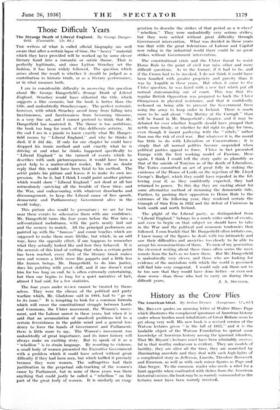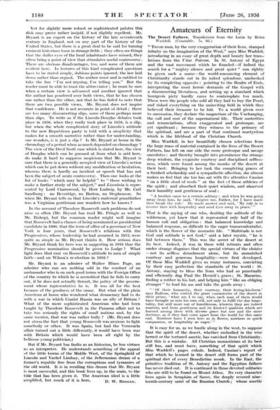History as the Crow Flies
The American Ideal. By Arthur Bryant. (Longmans.
Ma. BRYANT quotes an amusing letter of Walter Hines Page which illustrates the complacent ignorance of American history under whose burden most inhabitants of Great Britain seem to get along very well. His new book is a revised version of the Watson lectures given " in the fall of 1985," and it is the laudable object of the Watson Foundation to spread some knowledge of American history among the ignorant islanders. That Mr. Bryant's lectures must have been admirably success- ful in that worthy endeavour is evident. They are models of lucidity, they are alive all the time, they are nourished by illuminating anecdote and they deal with such high-lights of a complicated story as Jefferson, Lincoln, Theodore Roosevelt and Emerson, as well as with such minor figures as Page and Alan Seeger. To the common reader who needs a whet for a faint appetite when confronted with dishes from the American historical cuisine, the book may be as warmly commended as the lectures must have been warmly received. Vet for slightly more robust or sophisticated palates this dish may prove rather insipid, if not slightly repellent. Mr. Bryant is an expert on the history of the late seventeenth century in England, not on any part of the history of the United States, but there is a great deal to be said for turning eminent historians loose in strange fields ; they often see things that the duller eyes of the local inhabitants have missed, they often bring a point of view that stimulates useful controversy. There are obvious disadvantages, too, and some of them are evident here. In lectures of this kind complicated questions have to be stated simply, dubious points ignored, the law laid down rather than argued. The author must and is entitled to take the line " I'm not arguing, I'm telling you." But the reader must be able to trust the abbreviator ; he must be sure when a certain view is advanced and another ignored that the author has pondered over both views, that he has chosen one rather than the other, not that he has failed to note that there are two possible views. Mr. Bryant does not inspire that confidence. He is not accurate in point of detail ; there are too many disconcerting slips, some of them perhaps more than slips. To write as if the Lincoln-Douglas debates took place in 1856, when they really took place in 1858, is a slip, but when the whole complicated story of Lincoln's attitude to the new Republican party is told with a simplicity that makes for a smooth narrative rather than for understanding, one wonders, is it just a slip ? Is Mr. Bryant at home in the chronology of a period when so much depended on chronology ? The view of the Dred Scott case which is stated here, the view of Douglas which can be guessed at from what is said here, do make it hard to suppress suspicions that Mr. Bryant is sure that there is a generally accepted view of Lincoln's action which can be put down without any modification or hesitation, whereas there is hardly an incident or speech that has not been the subject of acute controversy. Then one looks at the list of books " which may be helpful " to " those wishing to make a further study of the subject," and Lincolnia is repre- sented by Lord Charnwood, by Herr Ludwig, by Mr. Carl Sandburg : no Beveridge, no Barton, no Stephenson. So when Mr. Bryant tells us that Lincoln's maternal grandfather was a Virginian gentleman one wonders how he knows ?
In the account of Theodore Roosevelt such problems do not arise so often (Mr. Bryant has read Mr. Pringle as well as Mr. Bishop), but the common reader might well imagine that Roosevelt had a chance of being nominated as presidential candidate in 1900, that the term of office of a governor of New York is four years, that Roosevelt's relations with the Progressives, whose leadership he had assumed in 1912, were quite as simple as Mr. Bryant thinks it. How serious does Mr. Bryant think his hero was in suggesting in 1916 that the Progressive nomination should be given to Lodge ? What light does that cast on Roosevelt's attitude to men of simple faith—and on Wilson's re-election in 1916 ?
Mr. Bryant is an admirer of Walter Hines Page, an admirer who can see nothing odd in the conduct of an ambassador who is on such good terms with the Foreign Office of the country to which he is accredited that he fails to carry out if he does not actually thwart, the policy of the govern- ment whose representative he is. It was all for the best because of the goodness of the cause. But what of the plain American at home who wondered what democracy had to do with a war in which Czarist Russia was an ally of Britain ? What of the more sophisticated American who had been taught by Theodore Roosevelt in the Panama affair not to take too seriously the rights of small nations and, by the same mentor, that war was rather bully ? (Mr. Bryant does not stress the fact that young Roosevelt was anxious to fight somebody or other. It was Spain, but had the Venezuela affair turned out a little differently, it would have been war with Britain which would have been all right by the bellicose young politician.) But if Mr. Bryant has faults as an historian, he has virtues as an interpreter. He understands something of the appeal of the little towns of the Middle West, of the Springfield of Lincoln and Vachel Lindsay, of the Jeffersonian dream of a farmer's republic free from the corruptions and tyrannies of the old world. It is in recalling this dream that Mr. Bryant is most successful, and this book lives up, in the main, to the title that has been given it. The American ideal is a little simplified, but much of it is here. D. W. Bnoosii.











































 Previous page
Previous page